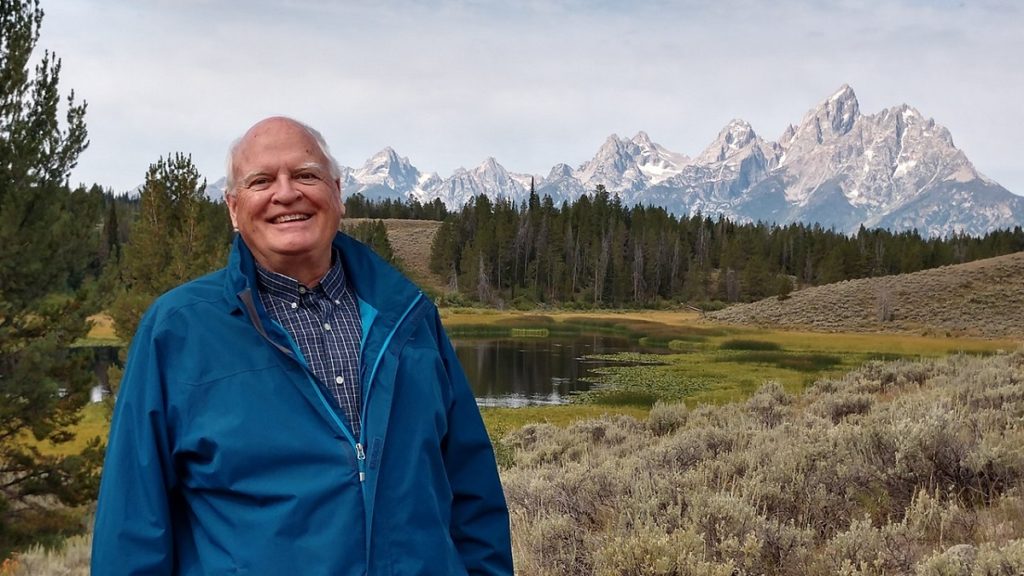Remembering Bill Sweney: Alaska loses a friend to COVID-19

Filmmaker Bill Sweney, 1948-2020: Alaska lost a friend on Earth Day.
By Christopher Childs
My friend Bill Sweney, film producer and director, and lover of Alaska, was taken by the coronavirus on Earth Day 2020. We were classmates in our teens, distant cousins, fellow nature lovers, and friends for more than half a century. I have never known anyone quite like him and, in the remainder of this lifetime, I expect that “I shall not look upon his like again.”
Bill’s work won an Emmy and a Peabody Award, a fact about which he was incredibly modest. He reveled in the Alaskan landscape, made more than twenty trips to the state, and in his mid-twenties, climbed Denali. He produced the remarkable 1983-88 “Portrait of America” series while working for Ted Turner, himself directing the “Alaska” episode working alongside narrator Hal Holbrook — an association in which he always took great delight. The pair had earlier joined forces to create 1982’s “Alaska: Story at the Top of the World.” After forming his own production company, Bill returned to the state once more to produce 1993’s “The Nitty Gritty Dirt Band Plays Alaska.” It’s the Band’s film, but it may also be as close as we’ll get to a celebratory hymn to Alaska from Bill himself.
William Homer Sweney, III, was born in Saint Paul, Minnesota, in 1948, and was raised there to the age of thirteen. With his parents’ divorce and his mother’s 1963 remarriage came a move to Massachusetts, and the acquisition of a brilliant, kindly mentor in his new stepfather, nature cinematographer and ardent conservationist Dick Borden of Concord, first head of the National Wildlife Federation. Dick’s footage graced Disney films of the day; he hosted and produced for television — working hand-in-hand with Bill’s mother, Brownie — the series “Wonders of the Wild,” and he produced Robert Redford’s influential “Project Eagle” public service announcements. Bill’s destiny was shaped through his relationship with Dick, on whose patience and insight he would reflect, years later, in one of our email exchanges.
The two of us found a compatible educational environment at Middlesex School in Concord, where we first met (and once performed together, along with a young William Hurt, in a production of Thornton Wilder’s “Our Town” that remained a favored memory of all of us through the decades). Thoughtful in both senses of the word, creative, and sociable, he came into his own by our senior year — we lived down the hall from one another — foreshadowing his future career by producing a film about the school that became a gift of our class to the institution, and was used for some years as an introduction to the place for prospective students and parents. In the months before his death he was at work, with his brother Michael, on the early phases of a film project with William Hurt and on promoting a cherished vision of an IMAX theater just outside Yellowstone, at Jackson Hole.
Bill headed to Williams after Middlesex, but later we both fetched up back in Concord; on different schedules, we each married and eventually moved to California. He went to work for Turner and I went to work for Greenpeace; he was the documentarian, I, the activist. We stayed intermittently in touch, and actually got together once in person in Santa Barbara; there came a divorce, the film opportunities were insufficient, and he went to work for an airline. Ultimately, he moved to Jackson Hole, and — some years later, after my wife and I had moved to Saint Paul — he and I began an electronic correspondence that is preserved in scores of emails in my Inbox and Sent folder. (Somewhere in the midst of this, my genealogical addiction revealed that we were actually distant cousins, via at least three lines.) The email exchange became more vigorous as our 50th reunion at Middlesex approached. At the event itself we met and reminisced. We then both determinedly showed up at our 51st. And 52nd. And were looking forward to the 53rd, set for this month — until the virus intervened.
Standing in my Saint Paul kitchen the morning after he left the planet, five minutes from where Bill was born and early raised, looking out at the Minnesota spring sunshine, a poem wrote itself in my mind. This is it.
One for Bill:
In the end perhaps we are all kamikazes,
Crashing to Earth.
Picking ourselves up,
Dusting ourselves off,
Finding ourselves in mortal bodies.Shrugging it off,
Blinking in the sunlight,
Saying, “It’s just for a while.”Then every once in that while,
Looking out in the night,
Into the stars.Looking into the stars and leaning,
Into the Divine Wind,
Until we can be,
Reclaimed.
Alaska has lost a great friend. So have I.
—
Christopher Childs is the National Speaker emeritus for the U.S. branch of Greenpeace, and the author of “The Spirit’s Terrain: Creativity, Activism and Transformation.”
Mountain West in Memoriam: Bill Sweney (Wyoming Public Media, 5/26/2020)


